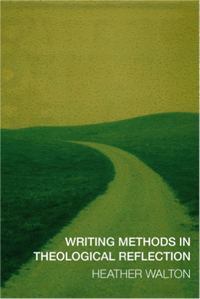
DARREN CRONSHAW uses Heather Walton’s book to ‘reconnect’ with creative writing…
Heather Walton
Writing Methods in Theological Reflection
SCM, London, 2014
ISBN-13: 9780334051855
 |
“Walton encouraged me in using journaling across a range of different uses – a spiritual journal to reflect on where God is in good or dark times, a creative journal to playfully sketch my response to issues, and a research journal to reflect on a project’s development, obstacles and opportunities.” |
As a practical theologian I am interested in the ”so what?” implications of where theology makes a difference and its productive potential. But my training is largely in the classical Western academic mould. Story-writing and other creative expression is largely about what I used to enjoy in primary school, rather than part of my toolbox or palette as a theologian. But I want to stretch and reconnect with creative writing that I both enjoy and that connects with otherwise untapped wisdom in the recesses of my mind. Thus Writing Methods in Theological Reflection was a timely book to find and enjoy over two summer afternoons.
Heather Walton is senior lecturer in theology and religious studies and co-director of the Centre for Literature, Theology and the Arts at the University of Glasgow. She is passionate about the craft of writing, as a creative writer herself and when training others. She appeals for attention to excellent writing processes and form in three genres: autoethnography, journaling and life writing – with introductory frameworks for each and then several beautifully crafted examples of her own writing.
Autoethnography uses personal experience as a lens to interrogate issues of cultural experience. It is becoming a more widely accepted important research methodology that acknowledges the self as research instrument. I especially appreciated Walton’s autoethnographical description of her engagement with the politics of church assemblies and advocating against injustices in society.
Journaling uses experience to see changes over time. It is key in learning processes because analysis of what we write in the heat of the moment helps tune self-awareness and development insights. Walton encouraged me in using journaling across a range of different uses – a spiritual journal to reflect on where God is in good or dark times, a creative journal to playfully sketch my response to issues, and a research journal to reflect on a project’s development, obstacles and opportunities.
My favourite chapter of the book was ‘The Course Outline: Teaching Theology Through Creative Writing’, narrating how Walton navigated the development of a creative writing workshop and offer space for students to be surprised by their writing journeys. I was tempted to google the course and enroll for a sabbatical!
Life writing analyses how our experience shapes our identity, gifts and calling. It is thus helpful for vocational exploration and formation, spiritual awareness and pastoral care. Walton writes transparently about how her own loves, infertility and parenting that have helped make her the unique person and theologian she is today.
In a fourth section, Walton unpacks the practicalities of poetics and writing conventions. She applies this to practical theology, public theology, pastoral care and everyday life. We need the best of writing to help underline the important messages of these different fields. For example, when speaking on public issues with a Christian voice, we need poetics to sharpen how we prophetically challenge the status quo.
As Walton explains, forms of creative writing are growing in theology and theological education, especially for students who reflect on their experience in supervised theological field education and chaplaincy training programs. But we need more of this sort of guidebook that offers critical reflection on how to write well in different creative genres and examples of good practice.
The book encouraged me to better tune assessment pieces when I invite students to write a Gospel-reading journal, to communicate their faith story, and to reflect on their experience of missional engagement for field education units. Students need scaffolding to make the most of these more creative expressions and not just write another essay or treat alternative assessment formats as a shortcut.
But Walton’s offerings are at their best in making the reader feel like an eavesdropper outside Walton’s study window, resulting in inspiring insights into the life and vocation of a writer/ preacher/ parent/ academic/ literary scholar. Writing Methods in Theological Reflection is highly recommended reading for ministry and theology students and teachers, for practitioners using writing to reflect on practice, and for writers looking for courage and guidance in broadening into more creative writing.
This review was originally published in Australian eJournal of Theology 22:1 (April 2015), 61-62, accessible at http://aejt.com.au/2015/volume_22/vol_22_no_1_2015/?article=742670
Follow this link to buy this book – Writing Methods in Theological Reflection.





